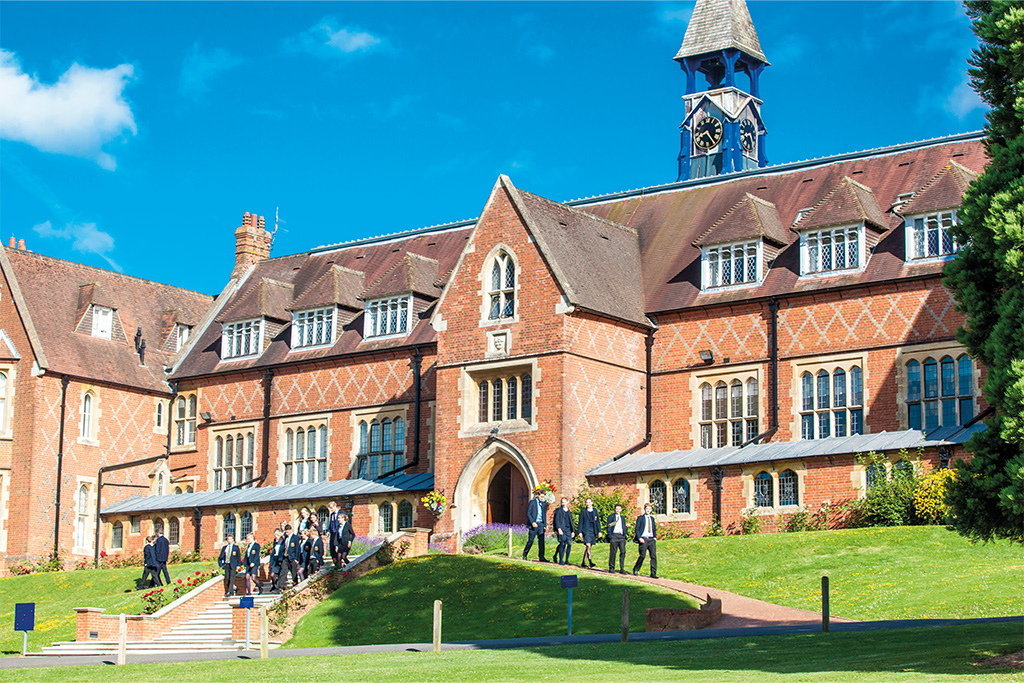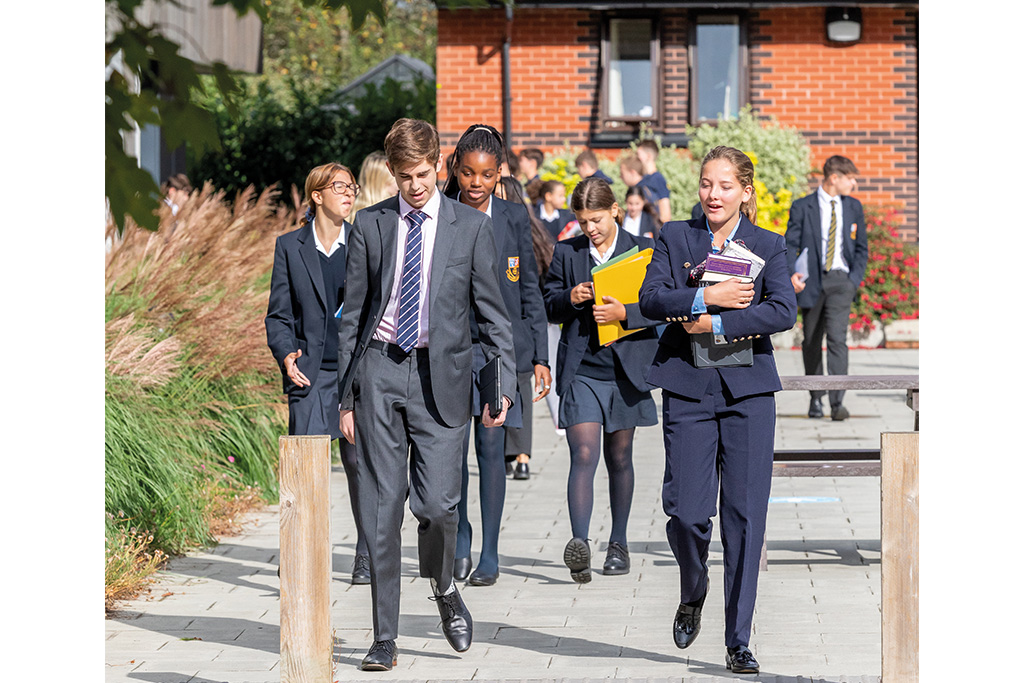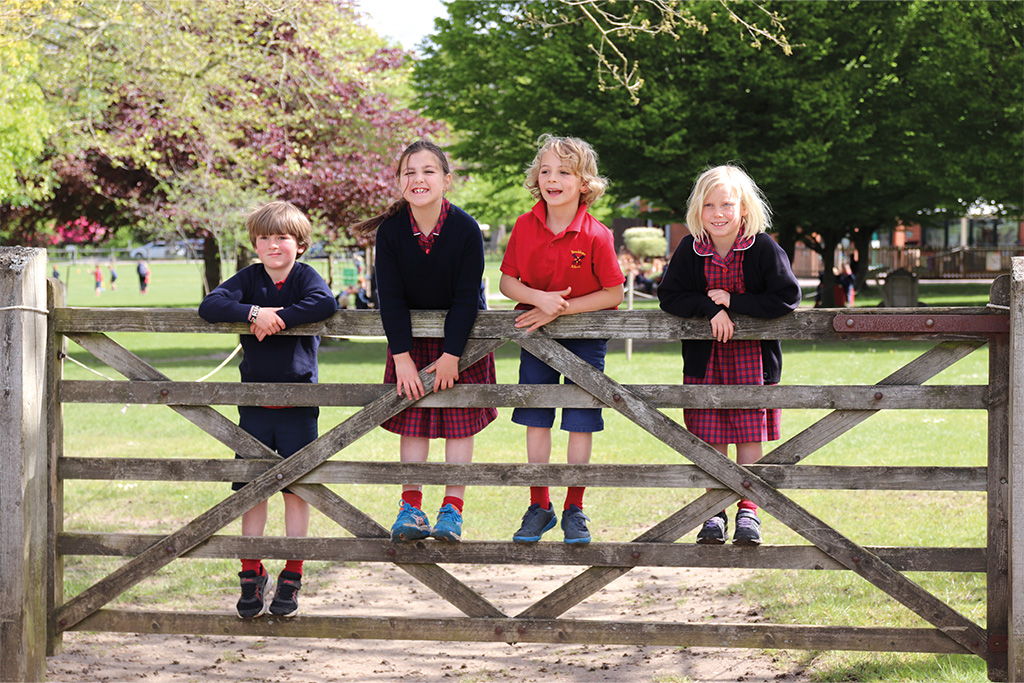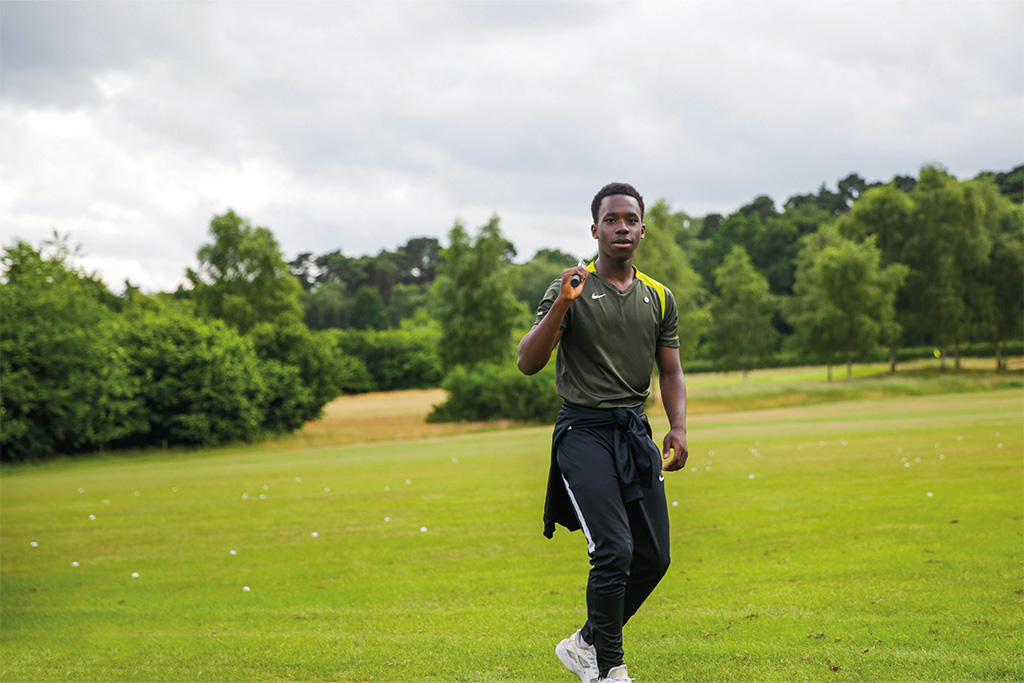Family Ties
By
3 years ago

Who still sends their children to the school they attended? Quite a few of us, finds Thea Jourdan: multi-generational schooling is common.

Meet the Harrison family, who, for three generations, have attended Cranleigh school set in 280 acres in the heart of the Surrey Hills. Today, it’s Henry, 16, and his sister Felicity, 14, (and hopefully little sister, Aggie, six, who is down to join Cranleigh prep in September 2023) who keep up the family tradition as they gain an education in the stately Victorian buildings designed by the school’s original architect, Henry Woodyear.
Back in the 1980s, it was their father, Mark Harrison, who played on the school’s lovely cricket pitch and beyond that, in the late 1950s, their grandfather, Jonathan Harrison, was the very first member of the family to enrol, when it was a boys-only boarding school with scary prefects (they are much nicer now).
The Harrisons are just one of a small but dedicated number of families who keep their education very much in the family – multiple cousins and uncles are also Cranleighans. According to the deputy headmaster, Simon Bird, there are more than a dozen legacy families going back two generations or more, who currently have children attending the school – which was founded in 1865 for the sons of local farmers.
‘When I did a quick survey of the house masters and mistresses, we came up with 12 in about five minutes,’ Bird says. ‘It’s something we are proud of: that so many people want to send their own children back to the school that they attended as children.’
And schools do take pride in their ‘legacy’ families. Harrow School even has its own Harrow Families archive, a remarkable and unique historical record of more than 800 families who have sent their sons to the Hill for several generations and, in some cases, since as far back as the middle of the 17th century.
For the parents who always opt for the same education destination, it is a winning formula. The agonising faced by many parents is not for them as their children reach school age and beyond – where to send them to be educated? As long as there is financial wherewithal (and sometimes they qualify for means tested bursaries), the answer is straightforward – they choose the school they attended themselves.
‘As human beings, we like the familiar things that we know,’ says Lucy Cawkwell, managing director and founder of Osborne Cawkwell Tuition, a curated group of expert private tutors founded in 2000. ‘It feels safe and reassuring to attend the same school that your father, grandfather or mother went to. It can contribute to a feeling of being part of a greater whole but one where your identity is valued and preserved.’
Cawkwell adds: ‘Having several generations attend a particular school possibly creates a sense of community and reinforces a particular ethos.’

Both Henry and Felicity also attended Cranleigh prep school which is over the road and always expected to go on to the senior school – in fact they only took the exam for Cranleigh. Felicity appreciates the fact that she is the first female to attend since prep, ‘especially as girls weren’t in the school with my grandfather and only in the sixth form with my dad.’ Their father, who attended Cranleigh from 1988 to 1991, says that he wanted his own children to benefit as he had done.
‘Having had my father wanting me to attend Cranleigh and have similar school day experiences to himself, I was very keen for my children to attend the same school where I had had so much fun and a great experience,’ says Mark Harrison.
Jonathan Harrison, who started at Cranleigh in 1959, says that watching generations of his family attending the same school has instilled a sense of belonging as well as a ‘reciprocal feeling of loyalty’ between him and the school. And while he is grateful that many things are still familiar, he is also happy that plenty has changed since his day. ‘Yes – enormously! The non-academic side of the school was run by prefects (which was bad for all concerned!) Today it is much friendlier. Better sports facilities have also been developed.’
Seeing your family members literally inscribed in the fabric of your school is one of the perks of being a second or third generation pupil. Oliver Backhouse, who now teaches at Highfield Prep School in Liphook in Hampshire attended the school himself between 2003 and 2008, regularly spots reminders of his forebears. He explains: ‘My granny opened the squash court and there’s a plaque there with her name on it. My dad, uncles, brother and I all have chairs with our names on in the dining room.’ When the time comes, he too would like to send his children to Highfield which has been coeducational since 1978.
As a teacher, Oliver already feels he is giving back. ‘I enjoy teaching at Highfield as I enjoyed my time here, so I came back. All the teachers are supportive and there is a good atmosphere around the place. I also get to contribute to the children at the school now and hopefully get them to have as good an experience as I did when I was here as a child.’

Highfield is not academically selective, although it feeds many of the top public schools and has a reputation, under Headmaster Phillip Evitt who has just retired after 23 years, of being academically rigorous.
Evitt has always been delighted by the attraction the school holds to different generations of so many families and sees this as a ringing endorsement of all that the school has to offer. ‘What is always central to their decision to send their own children here is exactly what you would hope to hear from former pupils; their warm memories of the friends they made, the teachers who cared for them, and the beauty of the grounds where they played so happily.’
During the application process for Cranleigh, when pupils are selected after a process of examination and interview, there is space for parents to indicate if their child has a family connection to the school, which will be part of the discussion process when that application is considered. ‘It’s not definitive because we aim to ensure that all children at Cranleigh will fit into the school, but family ties are taken into account,’ says Bird.
This is a similar approach taken by Wellington College, the co-ed boarding school founded by Wellington for the children of officers, in Berkshire. Applications from families with strong connections to Wellington College (e.g. Old Wellingtonian parents or grandparents, ex-members of staff) are warmly encouraged to apply.
As with siblings, community connections do not guarantee the offer of a place, but they do form part of school’s decision-making process and, at 13+, a child with a family link will be prioritised over a candidate who does not have a similar connection to the College (although they would not be prioritised over a sibling).

Many of the old public schools still maintain an element of this, including Eton, Winchester College, Harrow and Radley – for example. However, times have changed, not always favourably to the sons and daughters of alumni. ‘Schools are much more meritocratic now,’ Lucy Cawkwell adds: ‘Unless your child passes the academic tests and interviews, they won’t get in.’
And surprisingly, some less traditional schools increasingly encourage a family tradition. At Bedales, there is a bursary (founded by Old Bedalian family-man Sir Peter Hall) that is awarded specifically to children of OBs. Generations of Bedalians are starting to take advantage of this.
And Harrow itself, despite its Harrow Families index, is making huge strides to open the school to new parents starting the tradition for themselves. One parent recently admitted that she asked her child ‘where are all the posh people’ when he first joined Harrow. Testament, perhaps, to the fact that they are doing a very good job of integrating boys from all backgrounds, whether humble, professional or ‘old money’ to the point of class being irrelevant (at least inside school gates).
Simon Bird says that new families are just as important in the school community as those who come from a long line of Cranleighans, pointing out that most parents are first-time boarding families. ‘We aren’t an old school club. We want everyone to feel at home here, with a sense of tradition and permanence sitting comfortably alongside innovation and change.
‘It’s lovely that families come back to Cranleigh generation after generation but it’s like stepping back into a river. You never step into the same river twice because different water is flowing around you all the time. Over the past 20 years, since I have been at the school, there have been many changes and dynamic educational advances all the time.’
And families need to be flexible enough to look elsewhere if the fit isn’t right. ‘Sometimes parents may overlook the fact that a school is not right for a child and try and shoehorn them into the wrong academic setting,’ says Lucy Cawkwell. ‘Sometimes, a tutor does need to gently point out that a child may thrive somewhere else. Each child needs to be looked as an individual – that should be the focus if you really want your child to flourish.’
See the online listings for the schools mentioned here: Cranleigh Senior, Cranleigh Prep, Highfield and Brookham, Wellington College, Harrow School, Eton, Winchester College, Radley, Bedales.



